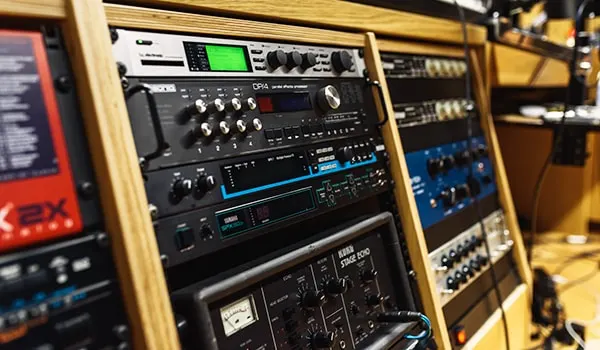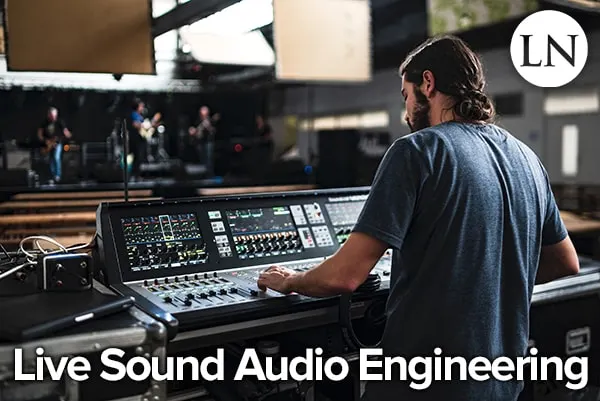
Don’t worry; we’ve got your back. In this article, we’ll explain in detail what an audio engineers is, how much their skills net on the market, and how you could take the first steps in becoming an audio engineer as a career.
What is an Audio Engineer?
Audio engineers and sound engineers are the masters of audio hardware and software that is used during the process of recording or mixing music or effects.
This means that audio engineers frequently work with people in the music industry and the film industry to help them accomplish the artistic goals that they have for their sounds.
Importantly, audio engineers are not audio producers. Whereas audio producers are responsible for melding the creating content of the sound to fit their vision, audio engineers are focused on execution and technical completeness in their work.
What Does an Audio Engineer Do?
On a day-to-day basis, audio engineers spend most of their time glued to the soundboard (mixing board) in an audio studio or processing pre-recorded audio files using a workstation.
As they work, audio engineers balance the levels and frequencies of the different channels of sound so that the output is high-quality and has the best characteristics for their client’s needs. In some cases, this may mean reducing the incidence of unwanted sounds in the audio track or altering the volume of some channels to emphasize them.
Likewise, they are responsible for physically operating and maintaining the audio equipment involved in recording as well as processing sounds. Some of these engineers may be employed as sound technicians or audio technicians if they have less experience and are filling a subset of the roles that would normally be filled by an audio engineer.

Also, audio engineers spend a lot of time setting up microphones and soundscapes so that their clients can record the sounds that they want. Most sound engineers, sometimes called sound technicians, work predominantly inside rather than outside, and there isn’t much interaction with downstream customers.
But, audio engineers need to collaborate closely with the artists or performers who need their services. In other words, audio engineers don’t need to sell their talents once they have a job, but they do need to discuss the goals of the people who they are recording.
Audio engineers may or may not work on a regular 9-5 schedule because their hours depend on the recording needs of their immediate clients. If an engineer is working for a news station or a live performer, they will probably need to adjust their work schedule to meet that of their client.
Types of Audio Engineers
There are a handful of different types of audio engineers, and their day-to-day work varies dramatically.
Studio
Studio Engineers are responsible for aiding producers in the context of a recording studio or broadcast station. While there is some overlap between the responsibilities of the producers and the responsibilities of the studio engineer, typically, the two roles are distinct.
Recording
Recording Engineers are audio engineers who specialize in recording sounds, whether those sounds are music or individual sound effects.
Mix
Mix Engineers aim to mix existing music or sound tracks together so that a new track results. Mix engineers are commonly employed by the film industry and music industry. They work on every piece of audio you hear coming from either of those industries.
Mastering
Mastering Engineers take the output of mix engineers and pay special attention to smoothing out audio levels to create a polished and seamless audio experience. As with mix engineers, mastering engineers are in demand by moviemakers and record labels.
Live Sound
Live Sound Engineers are a bit different than other audio engineer specialists because their primary job is to help live performances to produce the best quality sound on the fly.

Live sound engineers need more knowledge of acoustics than other roles.
Audio Post
Audio Post Engineers are experts in audio manipulation and audio mixing for the screen. There’s a lot of overlap between audio post engineers and mix engineers.
Systems
Systems Engineers take the output of live sound engineers and other types at live events and ensure that everything is in harmony. This means that systems audio engineers tend to be in more senior roles.
Audio Design
Audio Design Engineers work for video game companies and moviemakers to add soundscapes and ensure that audio is rendered properly in digital environments.
As you can see, there’s a lot of overlap between the different audio and sound engineering roles. The most important thing to remember is that these types of audio engineers are specializations. The skills of an audio design engineer are not the same as those of a live sound engineer, and there isn’t a very good chance that the two could switch jobs gracefully without some effort.
Audio Engineer Salary
Audio engineering is a moderately lucrative career. According to the Board of Labor Statistics, the mean hourly wage of an audio engineer is $30.53, making the mean annual wage a total of $63,500.
However, the lowest percentile of audio engineers make $25,680 each year, whereas the highest percentile makes $117,600, so there is a large spread depending on the job placement of an individual engineer.
In the US, there were an estimated 13,510 audio engineering jobs in 2018. This is probably an underestimate, though, because the Board of Labor Statistics claims that they only use the most narrow definition of what constitutes the job. Either way, there aren’t too many audio engineering jobs on the market.

On the other hand, tenure at an audio engineering job tends to be longer than with other jobs, and the workers have good job stability because their companies can’t perform their core functions without them in many cases.
Geographically, audio engineering is very concentrated in a few regional hubs. The largest of these hubs are in Los Angeles and New York City because of Hollywood and major media conglomerates, respectively. Outside of these hubs, audio engineering jobs tend to congregate in large coastal cities, especially on the East Coast.
If you live in the middle of the country or in a rural area, your access to audio engineer jobs will be very limited in comparison to someone living in New York City or Hollywood, unless you’re living in Nashville, so plan your career accordingly. Critically, wages for audio engineers are also much higher in the major hubs.
If you’re an audio engineer in New York City, you can expect to make around $10,000 to $15,000 more each year than an audio engineer in a rural area in the Midwest.
Is There an Audio Engineering Degree?
There are several schools and programs for audio engineers. Most programs are bachelor’s degrees, though there are also a few two-year degrees and a few graduate degrees in sound engineering if you want a less-intense or more-intense exposure to the subject.
For most audio engineers, a standard four-year degree is sufficient to find employment in the field, and the job market for more specialization via a graduate degree is not necessarily significantly better.
Many of these degree programs are from for-profit universities, however, so you should investigate carefully to make sure that it will make financial sense for you to get a degree from them before moving forward.
For example, The Lawrence Technological University offers a bachelor’s of science in audio engineering technology. LTU’s degree is representative of most of the audio engineer degrees because it features a mix of theory and practical skills.
Full Sail University offers several audio engineering bachelor degrees, including audio production, recording arts, and show production. While these degrees are technically for roles in production rather than engineering, the course offerings do encapsulate most of the competencies required of audio engineers rather than producers alone.
In terms of more focused offerings, the University of Hartford also offers a bachelor’s of science in audio engineering. Hartford’s program is considered to be more technically oriented than other programs because it focuses on acoustic theory as well as audio electronics.
There are countless other school choices. Click below to request information from any of the listed options so you can start to get a frame of reference for the coursework and costs. [Edit: Tool Removed]
While you’re at it, take a look at the other types of music majors available. They can lead to careers you may have more interest in, be more or less lucrative, but more enjoyable to your tastes.
That’s the Audio Engineer Job Description
Now that you’re up to speed on what it means to be an audio engineer, you can make a fully-informed decision regarding your career prospects.
Remember, audio engineers make a decent wage, but mostly towards the middle and end of their careers. There aren’t too many of these jobs on the market, and a lot of the jobs that do exist are in large companies in Hollywood or New York City.
On the other hand, if audio is your passion, being an audio engineer will place you in situations that you love but without the creative responsibility of a producer.
If you think you’re interested in becoming an audio engineer, you might want to investigate some of the degree programs we mentioned.